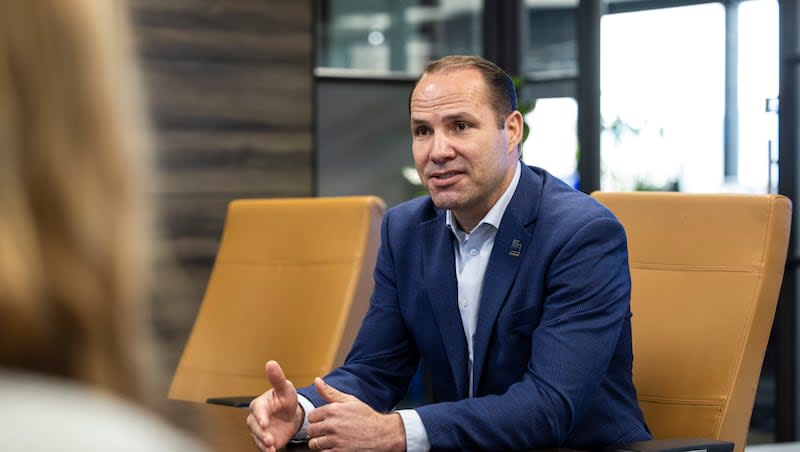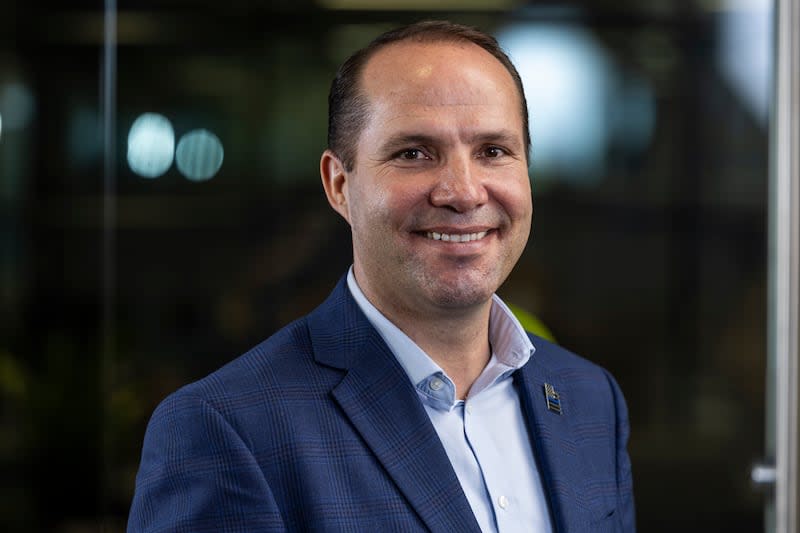Roosevelt Mayor JR Bird running for Congress to retake control of American energy

- Oops!Something went wrong.Please try again later.
- Oops!Something went wrong.Please try again later.
- Oops!Something went wrong.Please try again later.
Editor’s note: This is the third in a series of articles looking at the Republican candidates for Utah’s open 3rd Congressional District seat.
Roosevelt Mayor JR Bird says small-town common sense requires Congress to take back energy policy from the executive branch.
Bird, who is running to replace Rep. John Curtis in Utah’s 3rd Congressional District, is calling for comprehensive energy legislation at the federal level to avoid whiplash between every presidential administration, he told the Deseret News editorial board on Wednesday.
As the only rural candidate in a crowded competition for the open seat, Bird said he gives President Joe Biden a failing grade on the issues that matter most to many residents of central and eastern Utah, including restrictive public lands rules, “weaponized” environmental red tape and a policy agenda that blocks America’s path to energy dominance.
“We have a bureaucracy that is mandating certain things and creating policy and regulation that is affecting our livelihood, our industry and our ability to to provide jobs for our families and and in our communities,” Bird said. “And we need some representation back there that understands the overall impacts, not only for rural Utah, but for Utah as a whole.”
What does JR Bird want to do about energy policy?
Currently, whenever a new president is elected, a slew of executive orders are issued by the White House dictating new regulations — like where oil can be drilled, which products will be subsidized and how quickly industries must shift to renewables.
“That has created a a huge pendulum shift in policy from left to right and has been devastating for our economy and our citizens,” Bird said.
Bird listed just a few of the directives that have been issued by the Biden administration: making it more expensive to drill on federal lands, implementing a rule ensuring a majority of new cars are hybrid or electric by 2032, and pausing exports of liquefied natural gas.
These orders from Biden, as well as other measures leading to the “decommissioning of coal-burning power plants and the demonization of the oil and gas industry,” negatively impact Utah’s ability “to be self-reliant, self-sufficient and provide jobs and an economy that benefits its citizens,” Bird said. “And so that’s why I’d give him an ‘F.’”
Bird pointed to a specific example in Utah. The Uinta Basin Railway project, which Bird said would have brought jobs to Utah and decreased semi-truck emissions, was on track to meet federal qualifications during the Trump administration but quickly came to a halt after Biden was elected, Bird said.
Regulatory agencies under the National Environmental Policy Act were created with good intentions to prevent projects from destroying natural resources but they have become “weaponized by the executive branch to push a certain agenda,” Bird said.
“These projects ... (are) getting shut down by people in Vermont and Massachusetts and people that are really disconnected from our livelihood and our way of life,” Bird said.
Congressional action on a bill outlining the country’s energy policies would prevent presidents of either party from making energy decisions based on political expediency, Bird said. The legislation should recognize the importance of fossil fuels, nuclear energy and other renewable energy sources, he added, and take into account input from energy experts, industry leaders and regular citizens.
“We all understand we want clean air, clean water,” Bird said. “But we’ve got to do that at a reasonable rate, and it’s got to make sense, not only for the economy, but for the American people.”

JR Bird’s unique background in rural Utah
The issues unique to the state’s 3rd Congressional District — which encompasses Utah’s coal country, the oil-rich Uinta Basin and the nation’s sole operating uranium processing plant near Blanding — aren’t rhetoric for Bird; they’re his resume.
For the past 16 years, Bird has run Paragon Oilfield Products, which sells pipes, welding supplies and other tools for Roosevelt’s large oil and gas production sector.
Bird said growing alfalfa on his family farm, sitting on the board of the Central Utah Water Conservancy District from 2014-2022 and serving as Roosevelt mayor since 2017 has also given him a unique background in the natural resources and public lands issues that Curtis has championed over the last seven years.
As mayor, Bird has worked to improve government transparency by making public meetings more accessible and has created specialized committees to support the city council while also enacting term limits. Bird said he’s been told that he is “the most involved mayor that Roosevelt has ever seen” and he wants to continue Curtis’ reputation as being one of the nation’s most accessible congressmen.
If you ask rural Utahns, many of them will say Curtis has represented the 3rd District well by focusing on the issues closest to their lives, Bird said, which include efforts to find free-market fixes to environmental concerns and returning public lands to Utah control.
Bird initially announced a bid for Utah’s open U.S. Senate seat before switching gears and filing in the 3rd Congressional District race to replace Curtis. Bird said elected officials and stakeholders in energy, water and public lands pushed him to make the switch because his skillset was a good fit for the district.
Bird on public lands, immigration, Ukraine
Bird said he would continue Curtis’ fight to repeal a new Bureau of Land Management rule that allows the agency to lease land for conservation purposes and prevent other uses for the area. He would also work to transfer federal lands to state control, he said.
Bird’s criticism of the Biden administration extends past federal government overreach in Utah. He believes the country’s direction on immigration, national security and spending could pose equally large threats to Utahns.
The United States must “close the border” with Mexico, Bird said, while simplifying the immigration process “to get good people into the United States.” Bird supports a return to the Trump-era “Remain in Mexico” policy, which requires migrants seeking asylum to wait out their immigration proceedings on the other side of the border, but only if it is codified by Congress so that it lasts beyond the next administration.
Bird is skeptical of further funding for Ukraine in its war against Russia especially as the U.S. appears to be increasingly funding the Russian economy with Biden administration policies that exacerbate dependence on Russian oil.
On spending, Bird said a return to proper process, including statutory budget timelines and single-subject spending bills, is imperative to fulfill Congress’ “No. 1 fiduciary responsibility.”
Incurring a partial government shutdown might be necessary to reduce deficit spending so that lawmakers understand there are consequences for failing to pass a budget, Bird said.
He said he would also support measures forcing representatives to focus solely on spending bills, potentially without pay, until a budget is passed.
“If there are no consequences for Congress to not pass a budget, then they’re not going to pass a budget, I can tell you that,” said Bird.
Bird will appear on the primary ballot as one of four candidates, including Sky Zone CEO Case Lawrence, State Auditor John Dougall and commercial litigator Stewart Peay, who qualified by gathering 7,000 certified signatures. They will face the GOP convention nominee, state Sen. Mike Kennedy, in the June 25 primary election.
On Nov. 5, the Republican nominee will face off against Democratic candidate Glenn Wright.

